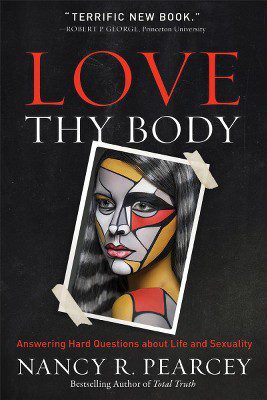 I love this book, brilliant if flawed.
I love this book, brilliant if flawed.
You should buy it and read it, but with a caution. This is not mostly a survey of philosophy, but when it is, the results are mixed. Pearcey makes a sound central argument: our culture has twisted apart body and soul and this is destroying us. When Pearcey does cultural analysis she is brilliant, but when she turns to the history of philosophy, the results are not as good.
Not So Sound History of Philosophy
The problem is less Pearcey than Francis Schaeffer.
Pearcey too often forces the history of ideas into a confusing image of “dualism” that she inherited from Francis Schaeffer. Pearcey should lose the image of upper and lower stories and write her book. I admire the good that Francis Schaeffer did, but Pearcey has surpassed her first teacher and his language hinders her argument.
As a result of echoes of Schaeffer, Pearcey (or at least this book) has an incoherent view of asceticism and monasticism. She recognizes that monasticism provided a home, community, and outlet for ministry for single people. At the same time, she persists in seeing the athletes of asceticism as motivated by a low view of the body. This is false and Protestant scholars like my former colleague Greg Peters would be able to help her see this.
Pearcey is after all a dualist about human nature: people have bodies and souls. Just as we can subordinate our bodies to our mental desires, so we can also be driven by bodily passions at the expense of reason. In practice, Pearcey gets this balance just right, but when she describes thinkers like Plato, Christian monastics, Descartes, and Kant she misses the mark.
After all, Pearcy agrees that dualism is true: soul and body exist. She is complaining about a misuse of dualism but this is not always obvious in her book. Pearcey is absolutely right that picking either matter or soul as all that counts in human life always leads to disaster. Where she goes wrong is in seeing the problem everywhere . . . sophisticated thinkers rarely made this error. Even an idealist like Bishop Berkeley who did not think the body existed (strictly speaking) did not think what we call the body did not matter.
Pearcey is correct that bad uses of dualism kill us. She is less persuasive when she assigns this fault to historical figures.
Plato and the monastics are examples which are too easy. Plato did not hate the body.* There were certainly neo-Platonists who did and they twisted Plato by taking parts of his dialogs out of context and ignoring more balancing ideas. For example, they overemphasized passages of the Phaedo and ignored large sections of Timaeus. Monastics and other ascetics were not haters of the body, that was and is heresy, but were men and women of great passion who wanted to bring their passions into control. Like any athlete, they disciplined the body to achieve great physical feats only in this case for spiritual ends.
Pearcey is right to say the body matters, is not evil, and that the flesh is part of the image of God. This vital truth is the center of the book. She overdraws the historic opposition to this idea, however, especially in non-Reformation churches. Most philosophers wrote in cultures too apt to praise bodily pleasures at the expense of mental and spiritual goods. They assumed people wanted physical pleasures . . . a lot . . . and saw this coming at the cost of hard mental work, spiritual reflection, or any other non-physical discipline. If like Augustine, you were very sensual, then you tended to over emphasize the mental. You could not imagine denigrating the body, because you were so sensual.
As was the case with Dreher’s Benedict Option, Pearcy should have resisted the temptation to write a quick sketch of Western intellectual history in a few paragraphs . . . seeing a real problem in the modern world in too many places in the past.
Yet this complaint must not ignore the essential brilliance of ninety-percent of the book. Pearcey is right: today we treat our bodies badly or ignore them altogether. Materialism has led to a low view of matter in popular culture! Christianity, where the Word became flesh, looks at the human body and sees an intrinsic part of what makes us human.
There is no humanity without physicality. We are not just ghosts in a machine.**
Absolutely Brilliant Diagnosis of Our Present Cultural Problem
We should respect our bodies and modern people too often do not. We view our bodies as meat sacks to be manipulated by our ideas, mental desires, or psychology. If Descartes is less to blame for this than Stan Lee, then we still have the problem. Comic book movies have presented the body (and physics!) as plastic. Slight people can jump through the air and knock down more massive people.
We do not respect our bodies as they are and have a prejudice in favor of mental desire. This is just as bad as ignoring our psychological desires and only taking note of our bodies!
Pearcey knows there is a problem in a broken world between what is and what ought to be. Science can report on what is: what is psychologically and what is biologically. She justly complains that American society favors what is our psychological desire over what is our biological reality. Christian ethics denies that either of what is (body or psychology) is perfect. We honor both realities (what is), but on our way to what nature and Nature’s God reveals should be.
Pearcey is one of America’s most gifted writers when it comes to explaining our present state. She mixes anecdotes from her extensive teaching career with ideas better than anyone this side of Ta-Nehisi Coates. If like Coates, she generalizes too often, this flaw is less important than the fact she gets the pressing issue right.
If she has misread Plato that will not kill our culture, but our misunderstanding of the role of the body which she gets just right would be fatal if we do not listen.
This is a must read.
————————————–
*Plato may not have hated the body. Some people read him as “anti-material,” but others do not. See my When Athens Met Jerusalem for a defense of Plato’s dualism.
**Descartes may have gone too far in this direction, but he was a very sophisticated thinker. He may not have! Pearcey would be better off not attributing errors to Descartes, but to some readings of him.












